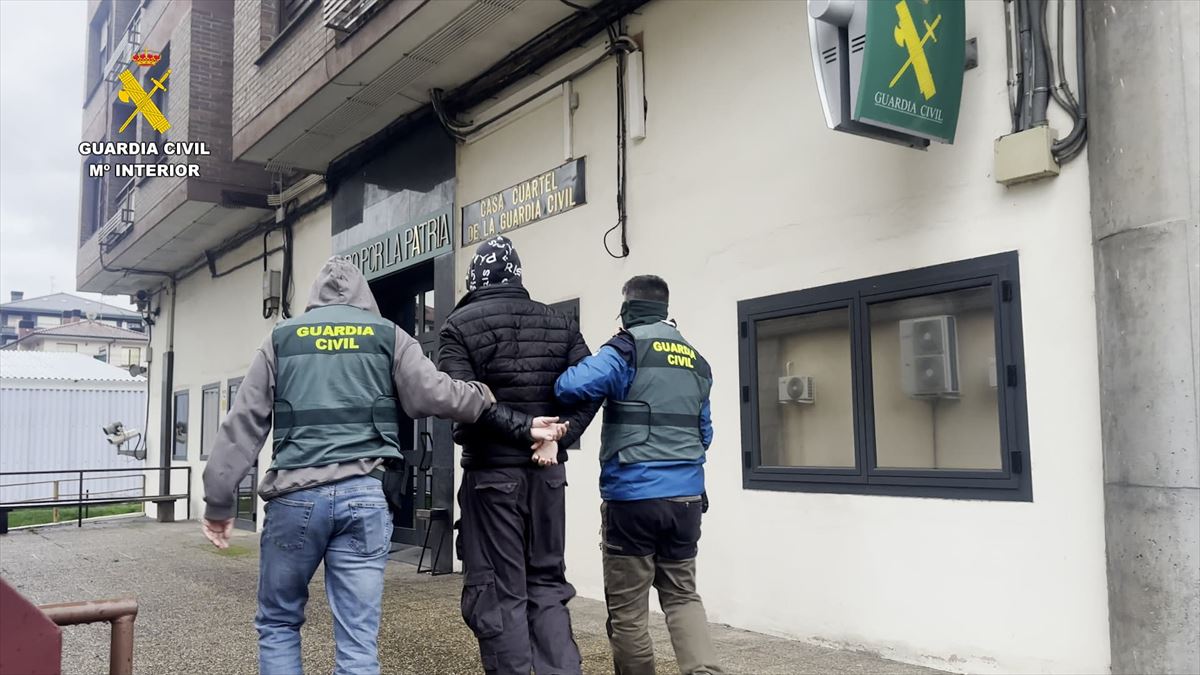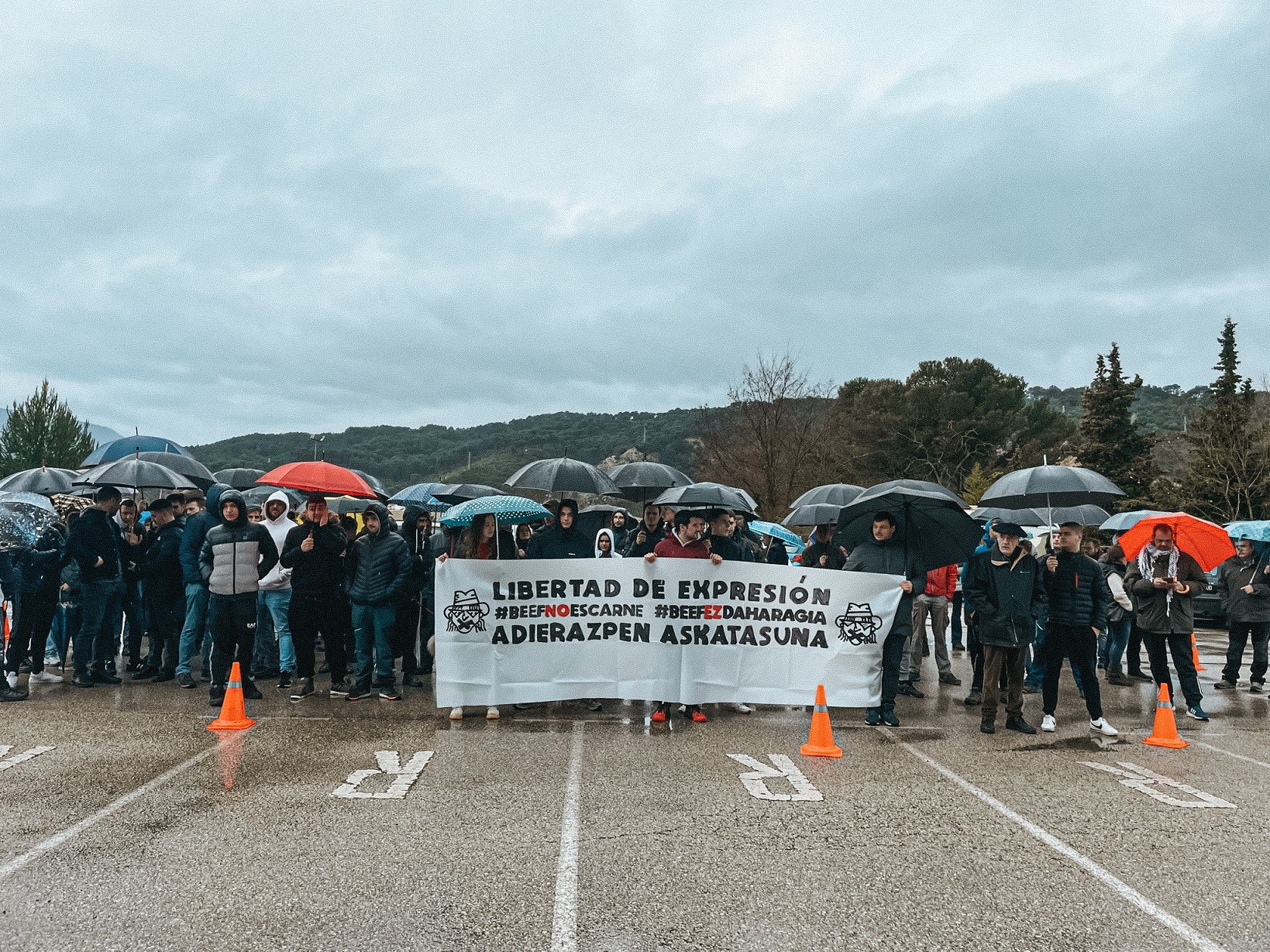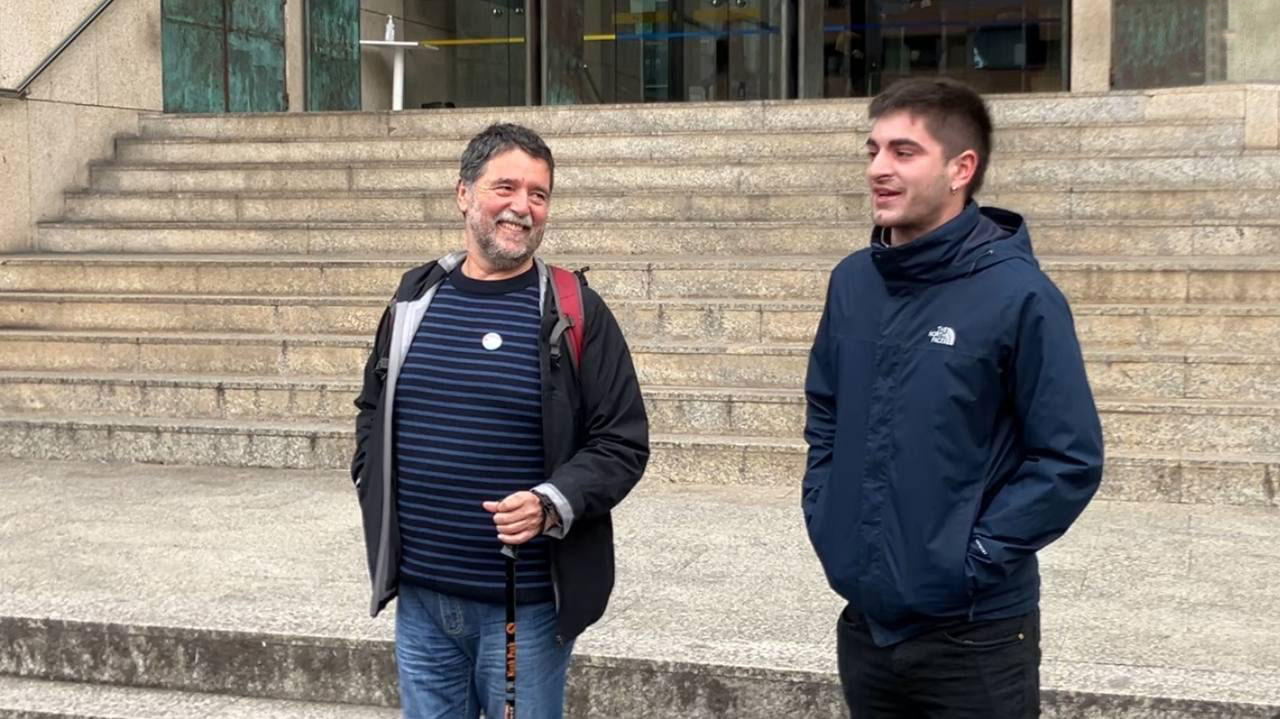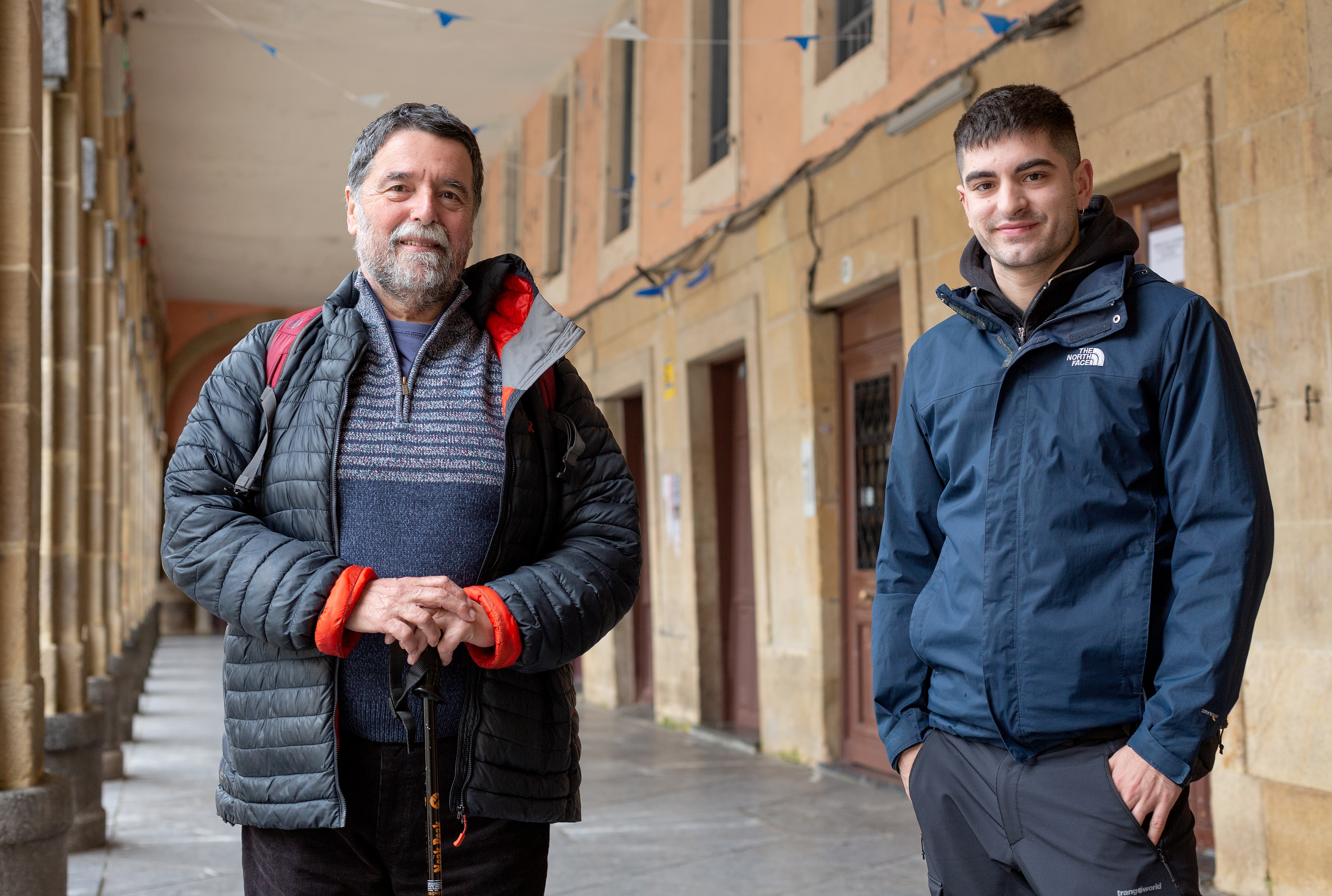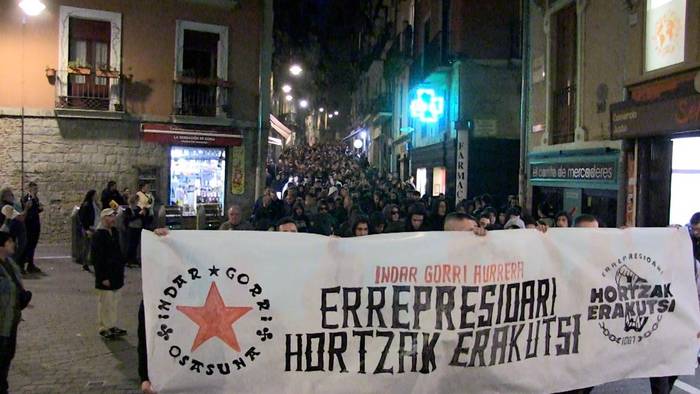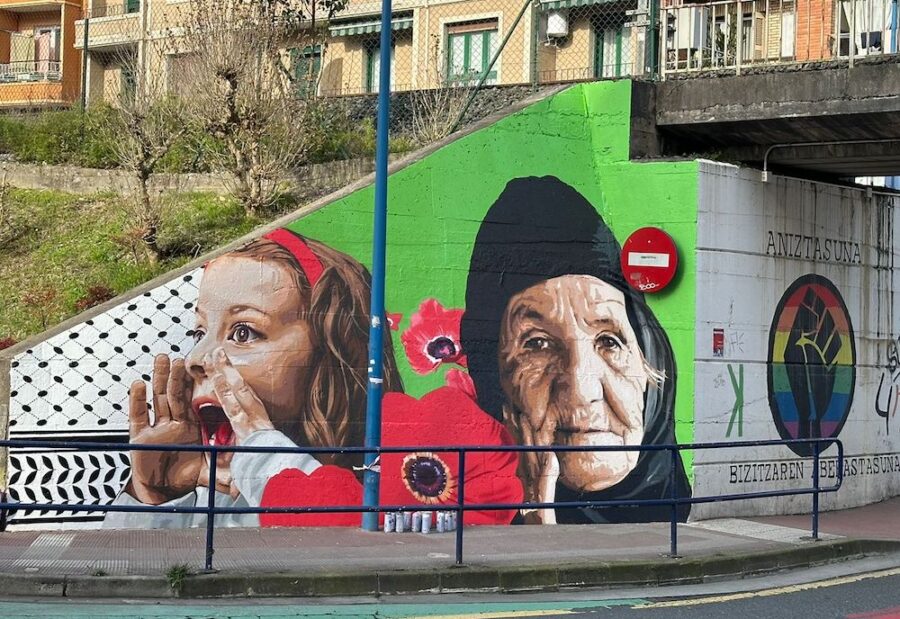Is the street everybody?
- The banner on the edge of the road welcomes drivers: “You enter Zumaia, slow down your freedom of expression.” The street has been put by the members of the Guztiona Da initiative, along with many other elements, due to disagreement with the ordinance that the City Council wants to approve to regulate posters, banners and murals. Although the debate has been described as absurd by the City Hall, a local fight for freedom of expression has begun in this town of Urola Kosta. They are not the only ones, because these kinds of ordinances are being adopted in many peoples.
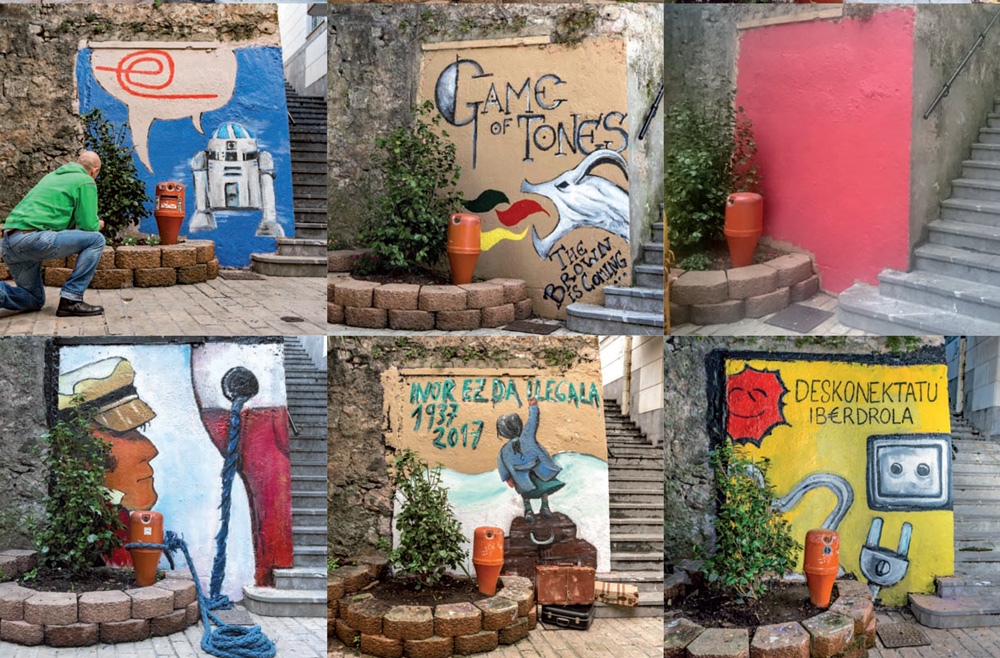
It's Saturday afternoon. The zumaiarras Lore Txapartegi, Bittor Bengoa and Pello Enparan have gone ahead of the mural that, after receiving the paintings, they have carried out with more partners. “He’s been elegant,” one said. “Very elegant, it’s sad to think you will be erased in a few hours,” the other replied. “We say the same thing with all the murals,” the third rounded. It is the mural number 28 that has been made on the same wall over ten months.
On this occasion a yellow mural with the motto “Disconnect the Ib€rdrol” has been made, with a smiling symbol against the nuclear ones. They have welcomed the complicit views and comments of the citizens who have gone down the street, photos and recommendations for the coming days. Murals have previously been held against violence against women, in tribute to Mikel Laboa, Imanol Urbieta and the refugees or in favor of the Basque country, to name a few, along with more artistic ones. The last details have taken good care of them, although they know that the City Hall will surely erase it tomorrow morning. That has been the case. At 7:00 a.m. on Sunday, the wall cleaners have painted brown.
“This ordinance would not be needed if we were all people, if we did what we do in our house in public space, it would not be needed and this dialogue would be useless,” said Zumaia Services Councilor Jon Iraola. The proposal on civic behaviour and the ordinance regulating the use, occupation and cleaning of the public road is not aimed exclusively at posters and banners, but the obligations of cleaning in the construction sites, camping ban, use of canopies or treatment with the municipal police go in the same bag.
Streets and bodies in the spotlight
In Lekeitio, members of the feminist group Potxuak Martxan were surprised to see that the mural they made on the beach was erased in early summer 2016. The mural in favor of the prisoners who shared the stage and Mikel Laboa's mural were kept in place. “Going to the beach and being scared to undress is also precarious. Beyond wages, we are precarious bodies and that’s why we draw empowered women,” said Uzuri Aboitiz.
After more than a month asking who had removed him, a meeting with the City Hall confirms that he had given the order. “They gave us very bad reasons, especially because our mural did not agree with their landscape criteria and the rest did not eliminate them for lack of money, but they would eliminate them.” In addition, he recalls that from the City Hall they were told that they would hire an artist and make a mural of female reefs on another wall, when there were still no traineras of female reefs in the town. “Great face wash.”

“We came to the conclusion that they did not dare with the prisoners and that Mikel Laboa does not bother them culturally, that they dared with us.” Both emphasized that the street and bodies are affected territories and that both have a political character. “In both of them they tell us how we should be, how we should show ourselves, we must present ourselves in an attractive and peaceful way. There was a lot of prohibition of a people who looked at the warlords.” The following day the Mayor has erased this mural into the gap left by the elimination, achieving great diffusion on the net, especially with moments of humor. For the next day I was already erased.
Convened by Lekeitio’s agents, an adhesion campaign was launched and in July, in full light, they repainted the original mural. “We did it without asking permission from the City Hall, because we saw that we had the permission of the citizens. Legitimacy of the people. With the tumult we created, they have not dared to take it back,” he says happily. “We will see if they try again before next summer.”

Need to apply for authorisation
“You get rid of a painting over and over again by a decree that is not signed. At first you get frustration, then a smile, when they paint above yours, they give you reason and feed you.” In Calle Guztiona Da Koldo Landaluze is the artist of the group in Zumaia. He himself makes the drawings of the murals. “It’s a very healthy way to cheer and color the street. They see conflict, I see subversion,” he says.
The note sent from the City Council to the press on 22 February 2016 is as follows: “The City of Zumaia has announced that it has decided to remove all signs and banners placed in the public areas of the town from now on, regardless of their content, message, origin or purpose.” The Kalea Guztiona Da movement, totally intergenerational, is the result of the open call made after knowing the decision through the press, both children, young people and retirees paint the wall. With the support of more than 30 associations of the people and the unions ELA, LAB, CCOO and ESK, they claim the street as a space for freedom of expression and fight against the “Mordaza Ordinance”. The mayor has banned this cartel or, after socializing the issue with the supports raised in the same line, in recent months a string is being pulled between this movement and the City Hall on a wall of Ribera Street, in the center of Zumaia. Citizenship makes a mural, directs institutions to remove them for the next morning. Again and again, almost a year.

“Seeing that the municipalities of the area have approved some ordinance, we thought that also in Zumaia it was necessary. We are seeing that tourism is growing in Zumaia and that many people come from outside and such an ordinance is needed,” says Iraola at his City Hall office. Although the posters are being removed every day, the ordinance is in the refrigerator one year after the first intentions appear. Asked for the reason, Iraola says: “There are so many things to do, we haven’t arrived. It is in a standby state.”
“They began by saying that they were against the dirt of the village. We told them that it was an excuse, that we too are against dirt, that we do not agree with people urinating on the street, for example. But, of course, that’s part of the ordinance, but that damn chapter 17 wants to ban banners, posters and murals,” says Pello Enparan. They call for this to be withdrawn and for the solution to be agreed with all the citizens and actors involved. “We do not give to dirt the meaning they give it, for them it is a message in the banners, is it dirty to denounce violence against women, ask for political prisoners’ rights or decent working conditions?” he says. Jon Iraola pointed out that the City Hall has placed 22 panels in the village, so the posters can be placed in it. The members of Kalea Guztiona Da are not happy. On the one hand, because the village panels do not exceed the ban on banners, murals and stickers, and on the other hand, they say it has been a measure without consensus. “Posters are made for people to read, so you have to put them in places where there are people, if not for what to do? The City Hall itself places the notes on the portals of the house.”
Control or censorship?
“We are not against murals, but what we have to do is present a project and ask for permission.” One of the problems of the conflict is that you have to ask for permission to place murals or banners. Kalea Guztiona Da members denounce control. “By no means,” says Jon Iraola. “If an association came to us, with a concrete proposal, asking for a permit, it would be something else. When it comes to holding the Women's Forum, the murals are made almost every year. Permits are requested, walls are chosen and painted. There is no problem there. Do we control it? No, no. It has nothing to do with it,” he says. The ordinance that the City Council has placed on the table is clear, but except for the exception of “events of great sporting, artistic and cultural prestige”, if you want to place or make posters, banners and posters in some space not authorized for this purpose, the identification of the person responsible, the location, size, the time that will be glued and the contents of the poster must be presented in advance. Authorization will be granted by the Municipal Government.
“They wanted to symbolize that we are looking for bonbo and saucer control,” says Jon Iraola from the City Hall. “If we were what we should all be, the common sense is that we cannot paint what we want to go down the street.” The old way of making politics, which a few have decided upon, is the policy of imposing on all citizens,” says Bittor Bengoa, recently made the mural.
To all agents to apply equally?
In March last year, the Arrasate City Hall approved and began to implement the cleaning ordinance. As they pointed out in a statement, “it is not a ban, but a more friendly and clean people”. Several citizens created the platform Mordaza Ordinance No to ask for a moratorium until talking to agents. They failed to stop, as it was adopted in plenary with the votes of PNV and PSE.
A few months ago they have been recollected. According to Aizpea Otxandiano, they have seen that the ordinance does not apply in the same way to all the agents of the people. “While some social agents are immediately removed from posters or banners, others are not applied. Recently came the circus to Mondragón and in all the streetlights panels were installed without authorization, or although the ordinance prohibits the placing of posters in the roundabouts, the City itself has not complied with it by citing two cases. We see that this ordinance is being used, above all, to remove posters from certain agents.”

When the Arrasate City Hall placed a sculpture on the referential wall to place posters, Ernai’s complaint action had a lot to do with the message “Mozaldun herri democrata”. “Otxandiano tells us that he is working to keep the posters out of the panels and meet with the groups and agents of the people. In the event that someone is fined for this reason, he is also asked to give notice, as he wants to keep track of the matter. The City Council has not yet taken the step of fining, but the ordinance envisages up to 250 euros for placing posters and banners outside the permitted places or for not withdrawing them in time. Sentenced to up to EUR 1,000 for placing "insulting" banners.
More and more peoples
“The City Hall of Beasain has banned the placement of posters on the walls and has placed several panels on the Gran Vía for this purpose. The week’s cartel concentration proved not to be enough,” begins the letter sent by Ander Jiménez in February 2017 to the newspaper El Diario Vasco (cannot be read on the net). “I believe that the use of public space deserves a social debate. Posters of cultural events, political demands and support for the dissemination of science, declarations of the fundamental right of citizens to political participation are being banned”. In his article he recalls that in the center of the town there are: “The labels of tobacco or beverages, the manikins semi-anorexic women that children take as a reference, with their influence on public health, the huge logo of a political party next to the park of Iturralde where children play, the panels of banks that throw away people without resources...”. It ends by calling for this measure to be withdrawn. “Streets are a common space.”
Bilbao, Donostia-San Sebastián, Pamplona, Vitoria-Gasteiz, Zarautz, Soraluze, Portugalete, Errenteria, Pasaia, Eibar, Ordizia, Altsasu or Bergara are some of the localities with similar ordinances approved by the Basque Government. It can be concluded that it is applied according to political will, since in some peoples, despite having ordinance, it is not applied, and in others it is done flexibly, in others it is done rigorously. The case of Burlada is noteworthy, since in 2014 the “Mordaza Ordinance” of UPN, PSN and PP has been rejected with the support of Ezker Batua. In many other peoples there is no such ordinance.
The possibility of reinventing struggles
"In this new political situation, power has been able to adapt to traditional forms of protest and has reduced the effectiveness of demonstrations, mergers, press conferences and traditional posters. This struggle for street use is an opportunity to rethink and experience us,” says Axier López de Kalea Guztiona Da. “Instead of resorting to the easiest, in everything we’ve done we’ve tried to turn the media and messages back, without losing humor and rigor.”
Koldo Landaluze says it's a matter of ethics and aesthetics. “With a specific point, the mural on the Ribera street, the key is to explain everything that is going on. That they delete it, we will do it again.”
In Lekeitio, the opportunity has also been taken to go beyond the usual methods of protest. “Humor and firmness were important in explaining things differently. They stood by,” says Uzuri Aboitiz.
Ways of making policy
“Our struggle is not partisan – says Axier López in Zumaia – and it must serve to make pedagogy, to use it also beyond Zumaia. The Ghastly ordinances have been applied in many places, and although it has sometimes been fought from a partisan point of view, there has been no strong argument for freedom of expression and street use,” he says. “No matter how there is PNV or EH Bildu, if there is no one who works public space and freedom of expression, they are left without arguments to face the prohibitive visions of the Moorish ordinances, as well as the leftist parties supposedly against it.”
“Some of the artists who are there had never seen them in the street making murals. By chance they are now starting to touch the hearts of the zumaiarras,” explains Jon Iraola, Department of Services of the City of Zumaia. Although this movement has addressed the issue to the wall of Ribera Street, the City Hall says that it is not against the murals and that some of them are “very nice”. Taking the book of murals and graffiti on the table, he explained that when the debate began they contacted several companies to make graffiti and murals. However, according to the knowledge of ARGIA, one of the most famous graffiti artists in Euskal Herria responded that he would not participate in the show, aware of the local controversy. This initiative is also paralysed.
“All of our freedoms as people are not limitless. I can't, for freedom of speech, shoot him for a shot because he leaves the foals. Everything has an umbrella, all rights, where, a little bit, they are limited,” says Iraola. “In the end everything is regulated in this life. We are giving another dimension that we should not give to this issue and I believe that we should not have this interview. It should be perfectly assumed that you can't go down the street writing things. And we absolutely agree with the motto of the initiative: The street is from Todos. Of course it's everybody's. That is why the City Hall regulates this street because it belongs to everyone. And we will seek the maximum consensus to draw that ordinance.” Asked about the fate of the case, answer the following: “Of course, the aim is for municipalities to come out in this legislature. If those on Guztiona Da Street sit down with us to speak, we'll explain where the topic is going. I don't know where we're going. The municipal staff will continue to remove the mural.” The members of Guztiona Da Street denounce “the hypocrisy of the City Hall”: “In a year there has only been a meeting in which all the neighbors and neighbors who have come to the meeting were very critical against the Mordaza Ordinance. The words participation and coexistence are used outright, but the prohibitions we are suffering for a year in Zumaia have been agreed by four politicians from the same party.”
“Here I command the logic, the social control and the enclosure that is in the background,” Bittor Bengoa is angry. “I am a trade unionist, legislative reforms have hampered the work of trade unions and messages have now been banned de facto. You can't bring to light your work, your demands, the problems of a one-off company, the layoffs, the dead -- it's all for the next day. You have to ask for permission from the political power as a union to put a banner – ask. But what is this?”
Steilas considers out of place the effort of the Rectorate of the UPV/EHU to prevent the participation of a person through a communication at the congress on Sovereignty(s) held recently in our university. We do not understand the attempt to obstruct the academic activity of a... [+]












